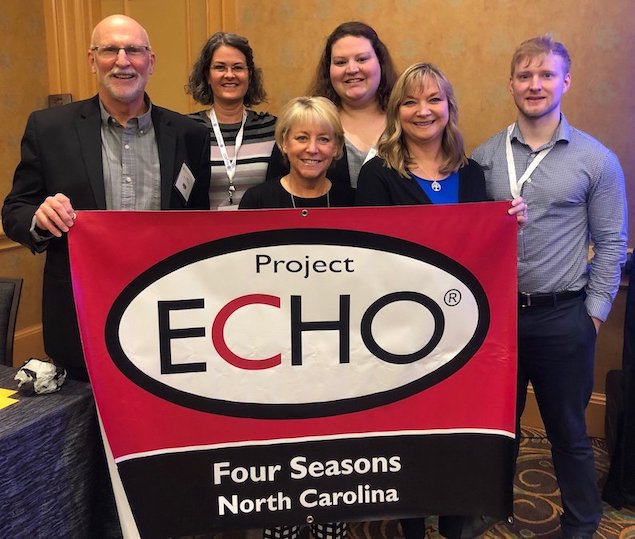Resilience in the Face of COVID-19: An Update from Four Seasons’ Project ECHO

This post was written in June, before the current surge in COVID-19 cases in North Carolina.
Health care workers the world over are suffering in the face of the COVID-19 pandemic. Our workload is heavy, and our stress levels are high. Although, until June, western North Carolina had not experienced unmanageable numbers of COVID-19-positive patients, Four Seasons transformed rapidly to prepare for that possibility. Telemedicine patient visits in all settings are now the norm; our hospice inpatient unit is accepting COVID-19 patients who are at the end of life; and Four Seasons’ Project ECHO (Extension for Community Healthcare Outcomes) initiative, “ECHO-Pal to Expand Palliative Care in the Carolinas,” has, like Project ECHO internationally, pivoted to a COVID-19 focus.
Project ECHO Background
Project ECHO was founded at the University of New Mexico Health Sciences Center in 2003, with the goal of sharing specialist knowledge to optimize best-practice care for people living in rural areas and those who are underserved. Through the use of multisite teleconferencing, Project ECHO links specialists with frontline clinicians in local communities. Together, they participate in video conference sessions that allow for knowledge sharing and mentoring through a combination of didactics and patient case–based learning—an “all teach, all learn” environment. The model is now widely used in the U.S. and in 31 other countries and is applied to more than 100 diseases and medical conditions across several hundred sites.
Four Seasons adopted the ECHO model with the aim of supporting palliative care team members in rural and underserved parts of the Carolinas. In so doing, we created a vibrant, close-knit, virtual palliative care community with whom we regularly share best practices, questions, and resilience strategies. ECHO-Pal to Expand Palliative Care in the Carolinas has grown to include more than 20 regular partner organizations over the past two years.
You can learn more about Project ECHO and our North Carolina–based initiative in our first article for the CAPC blog.
Using the Project ECHO Model to Focus on Resilience in the Face of COVID-19
Since the beginning of the COVID-19 pandemic, one of our main concerns has been the fear and anxiety reported by health care workers. We already know that moral distress, grief, and compassion fatigue all weigh heavily on us—both as workers in a frenetic and unfriendly health care system, but also as palliative care providers in a specialty that already struggled with staff shortages and burnout. Those of us in palliative care have specific skills in determining patient and family priorities and translating those preferences into actionable care plans, skills that are now called upon to advance goal-concordant care more than ever, and in new and creative ways. To remain in this work for the long haul, palliative care teams need to pay close attention to our own stressors, and we need a resilience plan. The palliative care team at Four Seasons has a few ideas to share.
For the past two years, in partnership with Project ECHO, Four Seasons has been offering interactive video conference education sessions for palliative care providers in the Carolinas. The ECHO sessions began pre-pandemic and were already on participant calendars. So, attending these sessions post-pandemic was not an additional burden for their schedules. We were in a good position to disseminate important information related to the pandemic.
Given the high level of trauma health care workers are experiencing right now, and the urgency of sustaining the clinical workforce, we decided that a focus on resilience made the most sense, and is perhaps the area of greatest need. Following are some of the project adjustments and additions we have put in place to maximize the use of the video conference format and our preexisting virtual community to stay connected and offer support.
To remain in this work for the long haul, palliative care teams need to pay close attention to our own stressors, and we need a resilience plan.
- Resilience didactics plus debriefing: One of our pre-COVID-19 offerings is a series that provides didactic learning and a structured debriefing session for providers. It focuses on reducing burnout and learning resilience strategies. As the pandemic was upon us, we had more requests for participation than ever before. We added more resilience sessions—doubling the number—to accommodate as many members of our community as possible. Participant numbers for these sessions have been among our highest. We have now shifted this resilience series to focus on COVID-19. Since the crisis started, participant comments and themes during our structured debriefings have been fully pandemic-associated. Participants clearly need to voice their angst. Many are expressing relief in the knowledge that their colleagues are experiencing similar complex emotions.
- Topic expansions: For our ECHO sessions devoted to areas other than resilience, we are shifting our didactics, case-based presentations, and skills trainings to COVID-19 topics as needed, including treating depression and anxiety, implicit bias awareness, review of medications being used to treat COVID-19 patients, and advanced communication skills for working with COVID-19 patients. While these topics aren’t specific to resilience, we think that providing this up to date, pandemic-relevant information will help reduce stress for providers.
- Supporting our own: Within our own hospice and palliative care organization, Four Seasons, our ECHO-Pal team has created a weekly, internal staff resilience series. We’ve enlisted the support of our bereavement team (music therapists and chaplains) and our social workers. To build community, we start by having participants introduce themselves; next a music therapist offers a song; we hold a short didactic session on a resilience topic; there is a facilitated debriefing session; and our chaplain then closes with a reflection. During our first debriefing there was no “awkward silence”. It was clear that people needed a platform for expression.
- Geographic expansion: We have recently been funded by the Cambia Health Foundation to expand our ECHO work, with a focus on COVID-19. In addition to supporting our clinical team at Four Seasons, we will support a clinical team at the Providence Health System in Washington, in order to facilitate ECHO sessions in the Southern U.S. and the Pacific Northwest. Sessions will cater to two cohorts—hospice and palliative care—and are open to all members of our interdisciplinary teams. With the COVID-19 overlay, we will focus learning on health equity/social determinants of health, providers’ resilience, clinical care of COVID-19 patients/families, advanced communication skills, and telehealth in the pandemic.
Through this work we’ve learned a few things. Our take home messages are listed below:
- Virtual convening meets a major need: Project ECHO’s virtual community is a valuable tool right now. It is a means through which health care workers can easily access local, national, and international sessions to share and learn what’s occurring in the COVID-19 space. This novel educational system has shown that it can nimbly refocus to provide whatever the learning community needs.
- Unprecedented demand for palliative care: Our pre-COVID-19 palliative care jobs require symptom management and communication skills and capacities that are ALL relevant to the complexities of patient care in the pandemic. Arguably, our specialty will need significant expansion and innovation in order to properly care for patients and families in this new era. We think the ECHO model can help us get there more quickly and effectively.
- Peer support and debriefing is essential: Health care workers need to connect with one another, whether practicing in the thick of COVID-19 patient care or not. I have heard providers express the idea that while we feel grateful for the time we have with our nonmedical friends and family these days, the lens through which we view this crisis is distinctly medical, necessitating that we share our insights and emotions with colleagues on that level.
Health care workers need to connect with one another, whether practicing in the thick of COVID-19 patient care or not.
The Project ECHO model has the potential to offer valuable applications for palliative care. We intend to expand evaluation of our project in the hope that we will effectively reach more providers, and through them, help deliver the highest quality palliative care to many more patients and families in need. If you are interested in participating in a Project ECHO palliative care group, please contact [email protected].
